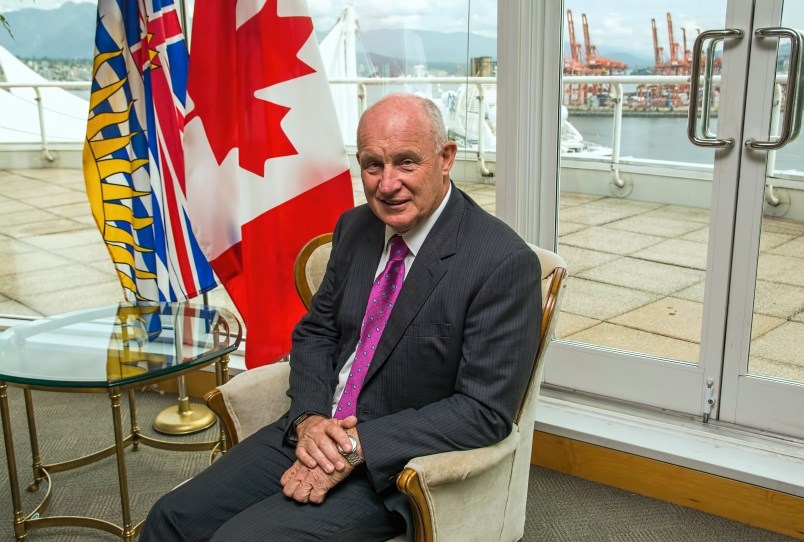Police and other law enforcement officials are now empowered to issue $2,000 violation tickets for price gouging of essential goods and the reselling of medical supplies, Minister of Public Safety and Solicitor General Mike Farnworth announced Sunday.
Citing the recent resale of face masks, Farnworth said some seedy people are preying on “collective anxieties” of the public during the global pandemic response.
“Violation tickets are a timelier alternative to prosecution through the courts and increase the Province's enforcement toolkit to support the COVID-19 response,” stated the ministry Sunday.
Aside from police, these officials will also be able to issue such tickets: municipal bylaw officers, liquor and cannabis inspectors, gaming inspectors, conservation officers, community safety unit inspectors, park rangers, natural resource officers, commercial vehicle safety officials and sheriffs.
Now, only authorized retailers may sell medical supplies and they must not sell them at “unconscionable” prices. The same applies to other essential goods, outlined in Farnworth’s
As it relates to price gouging, the order declares “essential” any goods and supplies that are necessary for the health, safety and welfare of people, including, without limitation, the following: “(a) food, water and other beverages; (b) fuel and gasoline; (c) health care goods, pharmaceuticals and medical supplies; (d) personal hygiene, sanitation and cleaning goods.”
The order states an “unconscionable price” means a price that “grossly exceeds the price at which similar essential goods and supplies are available in similar transactions to similar consumers.”
Consumer Protection BC will determine what constitutes an unconscionable price; the agency has already fielded over 1,500 price-gouging complaints, to date.
Hence, CPBC employees will assess the fair market prices in a community by taking a look at prices across the province and address significant variances at any given retailer.
CPBC said Sunday in a statement it “will now formally intake and assess price gouging complaints in the province, work with businesses to voluntarily correct the behaviour and liaise with other law enforcement agencies when escalation is deemed necessary.”
CPBC CEO Rob Giallereto told Glacier Media price gouging typically occurs in a local setting where a retailer may attempt to hike prices for no apparent reason.
There is no prescribed metric, he said, and retailers may have legitimate reasons for price hikes.
The ministerial order also states “consumers have an expectation to be able to purchase essential goods and supplies at prices that are reasonable, given supply chain considerations.”
But high prices for items in short supply are not necessarily price gouging, noted Giallereto.
Farnworth gave no indication as to how prices may be controlled in an environment of limited supply.
“Yes, there’s a recognition that prices increase on goods,” said Farnworth, leaving it to reasonable discretion what an exorbitant price is.
Farnworth said, “we’re in regular contact with supply chains and what is regular in the market.”
If an essential good were in short supply, it would be up to Farnworth to address it, said Giallereto.
This could conceivably be done by government ordering buying limits on consumers, price limits on retailers or taking total control of supply and distribution.
But Farnworth said there is no cause for concern at the moment around food supply.
However, “we are preparing plans if the situation changes surrounding certain products,” he said.
Giallereto said CPBC is working with government to address updating the public on enforcement action. He said CPBC is forwarding complaint information to the ministry. CPBC is a regulatory agency with enforcement powers, however.
According to the ministry, police and other enforcement officers “will independently exercise discretion to issue tickets for Emergency Program Act order violations under the Offence Act's Violation Ticket Administration and Fines Regulation (VTAFR).”
The ministry also added that if required, police and other enforcement officers will be able to actively enforce and ticket those retailers who exceed the quantity limits on the sale of specified items; and hotel and other lodging operators who do not comply with the requirement to provide accommodation at the request of the government to serve as self-isolation facilities or to support essential workers.
The ministry noted these measures “are in concert with the federal government's April 14, 2020, announcement that allows local and provincial police forces to issue tickets to returning travellers who do not comply with the requirement to self-isolate for 14 days under the federal Quarantine Act.”
Notably, the B.C. Civil Liberties Association has previously warned both the public and the authorities to ensure compliance officers and police don’t overstep their legal bounds after a ministerial order expanded such officers’ duties on March 31.
“It is important that people are actively aware and informed about their rights during the pandemic, and that police officers and compliance officers absolutely not over-reach their authorized powers in B.C.,” association executive director Harsha Walia said.
Those officers can now:
- monitor closed or restricted facilities and areas;
- give warnings, information and advice to persons in respect of public health orders, including warnings to persons who may be acting in contravention of a public health order; and
- provide health officers with information about potential contraventions of a public health order.
- detain an individual as a result of a contravention or suspected contravention of a public health order; or
- issue an order, fine or penalty, including an administrative penalty, under the Public Health Act.
Walia said there’s a fine line not to be crossed as to what kind of officer has what sort of power and authority. She said police officers, compliance officers and enforcement officers in B.C. are explicitly not empowered to enforce public health orders in BC.
“This means they absolutely do not have the legal authority and should not be ticketing or detaining people, including collecting identifying information, from people who may be in violation of public health orders,” Walia said.
With files from Jeremy Hainsworth



